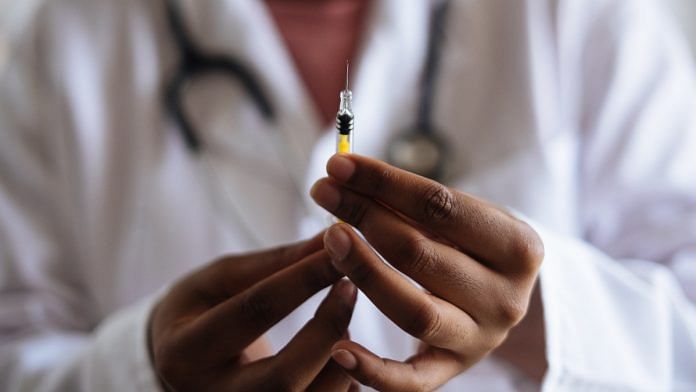The world is still struggling to contain the pandemic. Test-and-trace has met with implementation challenges and some countries – notably in Europe – are entering a fresh cycle of lockdowns and rising pandemic fatigue.
But another force – a reluctance to receive a pandemic vaccine – seems to be mounting.
Numerous pharmaceutical companies are working on vaccine trials, while organizations including the World Health Organization (WHO), Gavi and CEPI are also seeking to ensure any future solution is available for those most in need.
Progress over the past few months has edged the world closer to launching a vaccine, with news coming just this week, for example, that doctors in the UK are being told to be ready to administer a vaccine by Christmas.
But this latest World Economic Forum-Ipsos survey shows that confidence in taking a COVID-19 vaccine has dropped since August, with fewer people globally saying they’d get one.
Confidence has dropped
The survey shows that on average, across 15 countries, 73% of adults strongly or somewhat agree with the statement “if a vaccine for COVID-19 were available, I would get it”. 3 months ago, that figure was 77%.
At the time, the shortfall in vaccine confidence was significant enough to be seen to compromise the effectiveness of seeing an end to the pandemic.
Confidence is now down by 4 points compared to three months ago. Vaccination intent has declined in 10 of the 15 countries, most of all China, Australia, Spain, and Brazil.
More than four in five in India, mainland China, South Korea, and Brazil, however, say they would get a vaccine if available – compared to just over half in France and about two in three in the US, Spain, Italy, South Africa, Japan, and Germany.
Also read: India ready to help countries in Covid vaccine production and delivery, says Harsh Shringla
Why people are hesitant
The reasons people are reluctant to get a vaccine vary.
Globally, concerns about side effects are cited by 34%, and concerns about clinical trials moving too fast are cited by another 33%.
Among those who would not get vaccinated, worrying about side effects is most cited in Japan (62%), while the speed of clinical trials is most mentioned in Brazil and Spain (by 48% in both countries).
Globally, one in ten say they are against vaccines in general (including 14% in India and South Africa), they don’t think a vaccine will be effective (15% in Germany), and say the risk of their getting COVID is low (20% in China and 19% in Australia).
Around one in four adults (24%), across the 15 countries think the chance of getting COVID-19 is so low that a vaccine is not necessary at all. Adults in India stand out as being particularly likely to agree with this statement (52%). The US follows next, though at a distance, at 31%, while Canadians are least likely to agree, with only 16% sharing this opinion.
What about the timing of a vaccine?
The survey also looked at how soon people would get the vaccine. Half of adults globally (52%) say they would get vaccinated within three months after the COVID-19 vaccine is available to all.
More than two thirds would do so in Mexico (71%), Brazil (68%), and China (68%), but fewer than four in 10 in France and Spain (38% both).
As many as 90% in China and 86% in South Korea say they would get vaccinated within the first year of the COVID-19 vaccine’s availability, compared to just 54% in France.
When asked how soon they think a first vaccine will be available for general use for COVID-19, on average, only 45% of all adults across the 15 countries believe the first vaccine will be available for general use within the next six months. This includes the 16% who expect a vaccine to be ready within three months.
Instead, 55% think it will take nine months or more, including 18% who think it will take at least 18 months.
The belief that a vaccine will be available within the next six months is most prevalent in China (75%) India (72%), Brazil (67%), and the US (57%); it is lowest in France (26%), Spain (30%), and Japan (32%).
Also read: AstraZeneca CEO says Oxford vaccine on track for year-end, dismisses reports of delays
Vaccines won’t work if people don’t take them
The survey shows that aside from the challenges of manufacturing a vaccine and then ensuring its fair distribution, one of the great stumbling blocks is vaccine confidence, itself.
A separate study mapping trends in vaccine confidence across 149 countries between 2015 and 2019, found that scepticism about the safety of vaccines tended to grow alongside political instability and religious extremism. Confidence can be highly variable and shouldn’t be taken for granted.
Experts estimate that at least 70% of the population will need to be immune to the virus to stop community spread of COVID-19. Accomplishing this demands that public confidence in a vaccine is especially high and the current shortfall could be enough to limit efficacy.
WHO named public hesitancy towards vaccination as one of the Top 10 Threats to Global Health in 2019, affecting not only public health, but businesses and economies.
While the numbers in this latest study do show that overall, there is more confidence than not in a COVID-19 vaccine, the rising hesitancy is material and highlights that a vaccine won’t work if people don’t take it.
Gayle Markovitz, Editor, World Economic Forum
This article was originally published in the World Economic Forum.



